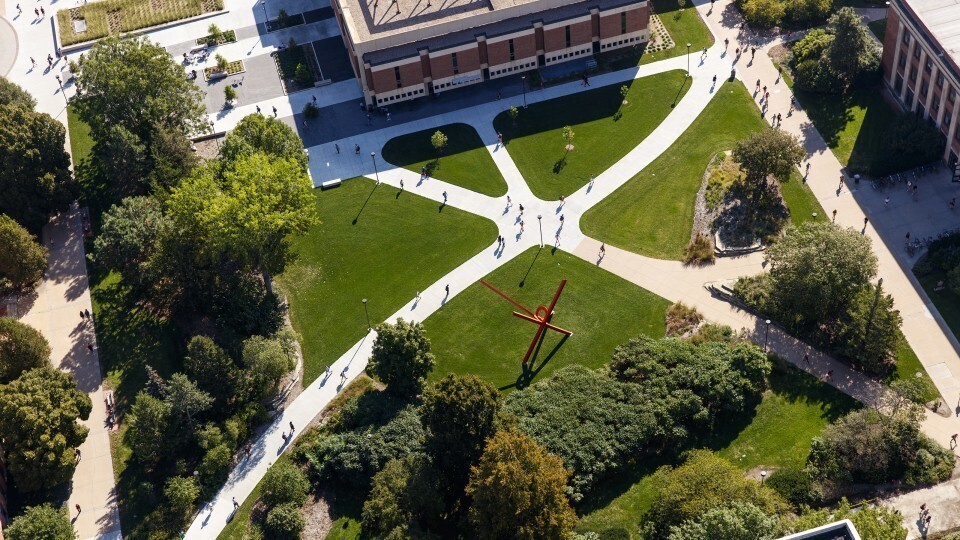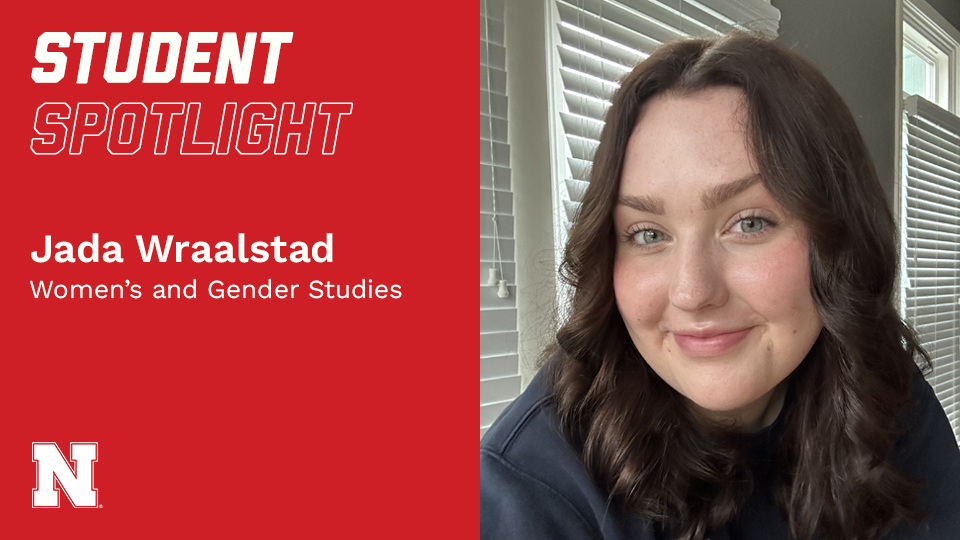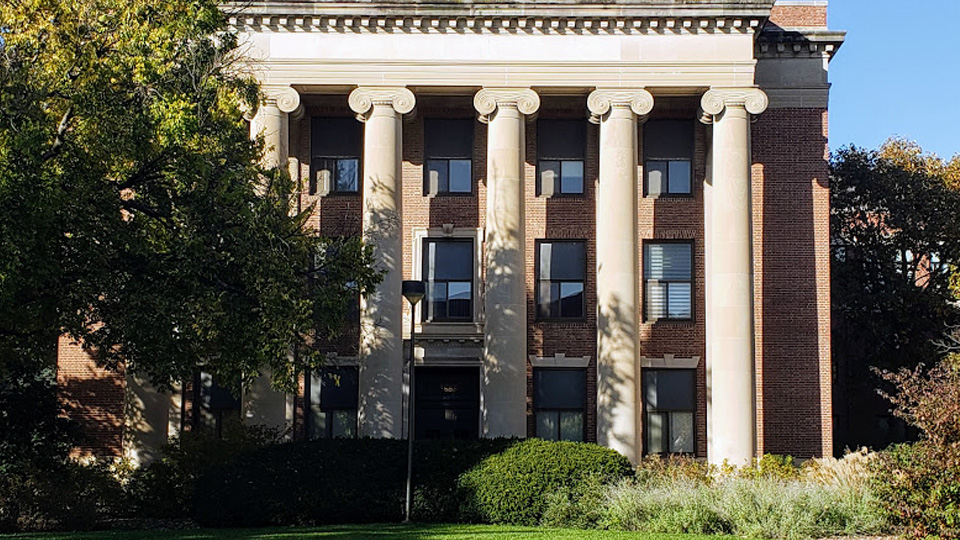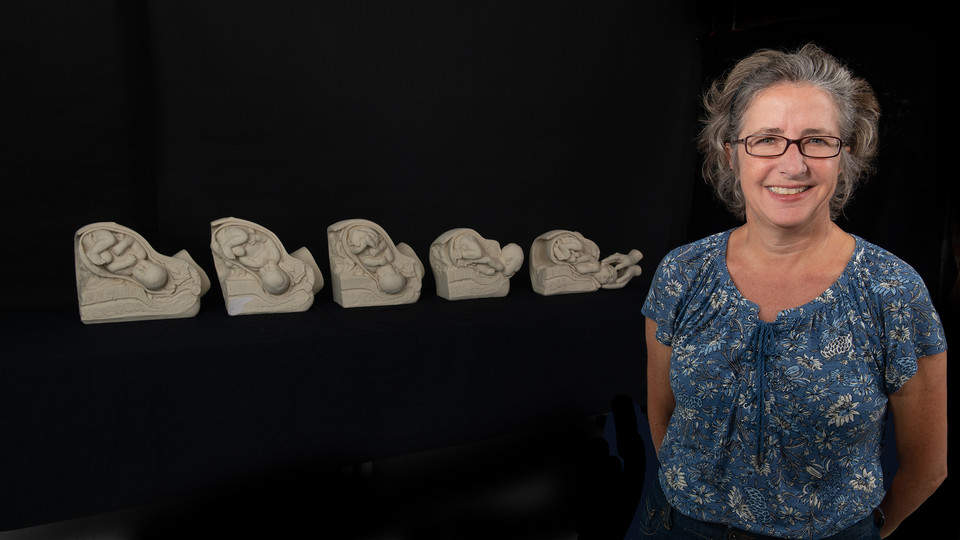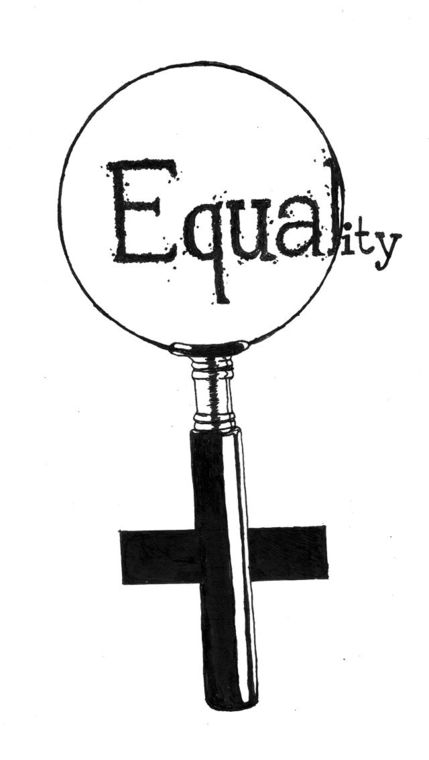
Setting criteria for feminism hurts goals of equality, UNL groups say
By Erin Mansur | Art by Hayley Heesacker on October 23rd, 2014 Daily Nebraskan
Of the various University of Nebraska-Lincoln organizations that foster and support feminist ideals, all agree that the basis of feminism is equality.
“It is this idea that women around the world, on campus and in the Midwest need to raise questions about rights,” said Chantal Kalisa, director of the UNL Women’s and Gender Studies Program. “Whether it’s economic rights, rights to certain resources or rights to sports. It’s just women looking for equal rights.”
Feminism is associated with other social issues such as education, reproductive rights, violence protection and prevention, self-determined gender, LGBTQ identities and civil justice for all ethnicities.
There are no strict requirements for becoming a feminist. Many people believe that being a feminist requires meeting certain criteria, although they tend to disagree on what those criteria are. Feminists such as Jan Deeds, director of the UNL Women’s Center, argue that setting criteria is unnecessary and inhibits the actions of feminists.
“I think that spending a lot of time defining ‘Are you being feminist enough?’ is a waste of time,” Deeds said. “And it’s a good way to keep women from moving forward, because if we are fighting with each other you can’t notice the real problems that we need to be addressing.”
Feminism has always emphasized equal rights, but the scope of who it advocates for has grown. The worldwide movement is currently in what is called the “third wave.” UNL has several organizations including the Women’s Center, Women’s and Gender Studies, International Association of Feminist Economics, SAGE and Students for Choice that are fueled by past and present feminist activism and ideals, and create events, support and communities for anyone interested in equality.
“I define feminism as understanding women as people alongside men,” said Medici-Thiemann.“It’s the fight for equality for the genders, associating everybody as an
individual shaped by their place in society and their place by their world. Not just men in one group and women in another group but everyone as individuals.”
Though feminist is not always used in the title, there are campus organizations that work toward the rights and equality of all genders and sexes. The work of these organizations help present information and action that affects individuals, communities and the globe.
International Association for Feminist Economics
International Association for Feminist Economics works through the University of Nebraska-Lincoln’s College of Business and is a direct contributor to the Rice Publishing House’s journal “Feminists Economics.” It’s a worldwide organization with over 600 members in 55 countries. With the help of other universities’ research programs, the IAFFE gathers statistics and data on issues directly impacting women. The information put out by IAFFE is used by organizations such as the World Bank and the Ford Foundation. Ann Marie May, director of IAFFE, said that the organization works to promote the presence of gender in scholarly research.
“IAFFE is one example of UNL’s feminist work,” May said. “IAFFE has been doing the work and giving a home to research for the past 20 years. It started out 20 years ago as exceptions, just asking that women were mentioned in the last chapter and then saying we’d covered gender. It’s caused a complete change in economics, there isn’t a non-government organization (NGO) out there that doesn’t recognize that to study something like economic development that you have to include gender.”
IAFFE has been at the forefront of promoting the understanding and application of gender’s impact in economics and global physical development. Their mission statement describes them as “an open, diverse community of academics, activists, policy theorists and practitioners from around the world.”
“It’s a place where scholars interested in gender issues and gender research could pursue the studies that bring knowledge about these issues,” May said. “It’s developed worldwide and developed in the state of Nebraska. Our common cause is to further gender-aware and inclusive economic inquiry and policy analysis with the goal of enhancing the well-being of children, women and men in local, national and transnational communities.”
The studies published and organized by IAFFE have aided women’s rights in a variety
of ways, including showing the benefits of sponsoring a low-income region.“Our view of feminism is not just focusing on women,” May said. “We happen to think that when everyone is given the opportunities, that families are better and that everyone is better off. Without a home like IAFFE, you can imagine that in an area like economics that women’s issues don’t get analyzed and studied.”
Womens and Gender Studies
Women’s and Gender Studies is strongly influenced by staff and students who are observant of feminist issues locally and globally. The courses are not specifically altered to follow any feminist agenda, but promote equality and understanding of women, gender and sexuality. They look at research, activists, public figures and other members of society throughout the fields of history, English, media and psychology.
“Women’s and Gender studies really advances equal rights for all,” said Kalisa. “They’re going to be involved in civil rights, in sexuality, in studies for the same reason. You can’t just ask for one group.”
According to its first chairwoman Moira Ferguson, the then Women’s Studies Program was sparked by national movements in the 1970s to “elevate the standards of justice and democracy in the United States.”
The course work is mainly based in looking at gender-related theories and history. The civil rights movement, women’s suffrage movement, women’s liberation, American Indian Movement and Stonewall are only a few of the historical events that are analyzed. The impact of past events and the future of equal rights go hand in hand with the variety of courses that can be prevalent to a student’s specific interest in an equality or feminist topic.
“Women’s and Genders Studies is an academic program, which means we have courses, majors and minors,” said Kalisa. “So, the different instructor’s goal is to look at materials and knowledge. What has been written about it, what has been produced about it. The goal is to promote student’s knowledge and encourage students to ask questions about how relevant it is in real life. We’ve had students who have gone out to do health work, who are psychologists, who are geologists. You need to have some knowledge.”
Feminism is not a required belief system, but feminist theories and
feminist perspectives will impact the course work.
The department also supports speakers on the issues facing feminists and women in modern society. They promoted Orange is the New Black actress and transgender activist Laverne Cox in her presentation “Ain’t I a Woman” this September. They’ve promoted novelists such as Ana Castillo, activists such as Karma Chavez and many others from around the globe.
Kalisa said she is glad the organization is present on campus because it provides an environment where discussion can take place.
“The fact that we exist, that gender studies exists, means that they are supportive of this kind of knowledge,” Kalisa said.
Women’s Center
The Women’s Center is a branch of Student Involvement at UNL, located on the third floor of the Nebraska Union. It was started in 1971 and is mainly a volunteer-run organization. It houses counseling, a safe space, a discussion room and a resource library that promotes women’s and gender empowerment on campus. Their focus is on students and the Lincoln Community, with services and events that can directly aid and encourage women on campus.
“One of my favorite things is when we go and do presentation for PREVENT or the Women’s Center, and seeing people being engaged,” said Jamie Porter the PREVENT coordinator. “They contribute to the conversation and share their stories, while coming up after words and asking how they can get involved.”
The center provides a healthy and positive environment that facilitates discussion about relationships, body image, violence prevention and other gender issues. They house PREVENT, a student organization that also works with the UNL Athletic Department to end relationship violence and rape. PREVENT provides presentations, group discussions and information about these topics. The Women’s Center, in partnership with Voices of Hope, helps organize Week Without Violence in October, where speakers and activities are held around campus to bring awareness to violence against women and other minorities. During this event, something that caught the attention of Local TV agencies in Lincoln was when the Women’s Center organized Greek fraternities to write a pledge in how they act up against relationship violence.
“This is a big step, we had all but five fraternities write in,” Deeds said. “To have most of the groups say that ‘this important, it on us,’ I’m very excited about that.”
Though these actions are not dictated to a feminist agenda, the social activism focused on by the Women’s Center parallels feminist ideals. In addition to prevention of violence, they provide information about sexual health, gender identity and workplace equality. They provide assistance for all genders of any ethnicity, with support groups that target anyone from Latino men to black women. Over the last 43 years, Jan Deed said she thinks that the center’s activism has grown from ideas of volunteers into actions performed on campus.
“That’s one of the joys of being part of a movement for a long time,” Deeds said. “To see it move from a fringe into the mainstream, so then it is just normal.”
Local
Several factors come in to play when students choose to identify with a label. They question whether it is relevant to their daily lives and truly a necessary layer to their identity. Regardless of the department or activity, the ideals of feminism are encompassed through alternative words and ideals. Labeling oneself as a feminist is not required.
“The generation we have right now might not need that word to do feminist work,” said Kalisa. “It might be passé, I think it’s more of an interjection, ‘why would I need to label myself that way.’ It’s the same mistake that people make about Civil Rights saying, ‘oh, we don’t need to revisit that.’ Some people, men and women, who would say ‘now we can go to college, now we can do this and that.’ Its like people are being relaxed about it. But not realizing there are so many questions that have not been answered. Like 77 cents to a dollar that men make compared to women. Questions about health care. Questions about mothers having to leave their jobs to take care of their kids, whether by choice or not. It doesn’t matter but there is still interesting questions. I think the young generation could just be misunderstood. We have made progress but we are not there yet.”
In a poll conducted last April by the Huffington Post, only 26 percent considered feminism a positive term, while 37 percent considered it a negative term. http://www.huffingtonpost.com/2013/04/16/feminism-poll_n_3094917.html
“Focusing on the word is always misleading,” said Kalisa. “There are people who practice feminism all the time. Who are practicing or asking for equal rights. That’s an act.”
Organizations like Women’s and Gender Studies and the Women’s Center choice to use alternative words to promote action of feminists ideals of equality.
“Changing the word to women’s, or just making it equal rights, everyone in the US everyone in the Midwest gets it,” said Kalisa. “Equal rights, fairness, equity, these are very useful terms. If you are in a group people who think feminism Is man-hating use the proper action words. Justice, equal rights. If you were to be in a meeting, you would not necessarily use that word. Even my faculty, they don’t use that word because it’s not about the word. It’s about the actions. The point is not to advance the word feminism, the point is to advance the feminist work, like women’s rights and gender rights.”
Ann Mari May said that she too believes that the word feminism shouldn’t be debated because it sidesteps the bigger issues at hand.
“Words create deviations and focus on the semantics of it is not productive,” said May “I think there are some people who want to argue about *the words*, but I’m more interested in real world problems. How we can study and put curtain policies in place to make the world a better place.”
The word feminist is sometimes met with pushback and reluctance, Deeds said the best way to work through these kinds of definitions based disagreements is to discuss the issues at hand.
“Redirecting the conversation because it is easy to get caught up on those little things,” Deeds said. “Maybe the word is not as important as what the next work that needs to be done.”
